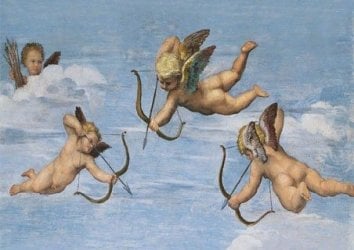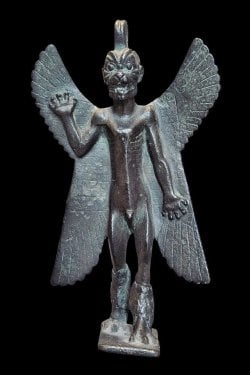- Sep 22, 2013
- 4,956
- 250
- 85
Since the modern world is full of media images and cinematic avatars who signify a social consciousness regarding values, virtues, and vices, we can evaluate how these idols/avatars represent a new age imagination regarding ethics and consciousness itself!
We see wolfish fictional A.I. robots such as the villainous 'first-knight' Decepticon named Cyclonus from the Transformers (Hasbro) franchise, we see folk-mythos old-world avatars being used for modern customs and festivals such as Cupid (Valentine's Day), and we see cinematic 'demons' such as the soul-possessing idol Pazuzu (from the film The Exoricst).
These intriguing 'characters' or 'dolls' signify a new age focus on self-image based intelligence/imagination, perhaps very relevant to our faceless world of consumerism-based networking (e.g., Facebook, eTrade, NASDAQ, Instagram, etc.).
How will archaeologists of the future look back upon these 'civilization figurines' and idols?
Will Christianity be considered the primary 'defender' of idol-based religious storytelling (e.g., AntiChrist, archangel Raphael, Golems, Satan, etc.)?
====
CYCLONUS: wolfish first-knight of the evil Decepticon robots; Cyclonus is wily, ruthless, seductive, dangerous, and deceptive; Cyclonus symbolizes betrayal and terrorism.

CUPID: old-world mythos-avatar signifying the power of creating love with magic arrows; Cupid has been used in modern times as a Valentine's Day romance-promoting muse/avatar; Cupid symbolizes daydreams about imagining the love in others (if not ourselves).

PAZUZU: fictional demon-figurine and possessing evil spirit from the Christianity-oriented evangelical haunting religious-horror film The Exorcist; Pazuzu appears as a menacing 'gate-keeper' of vanity and pride; Pazuzu symbolizes pure corruption and desecration (of uprightness).

These characters/dolls really reflect a human investment in avatar-based storytelling. Christianity is filled with images/stories about fantastic/unusual characters and even gods who signify a human imagination regarding trust or anarchy. Will archaeologists look back at our time and notice the countless Internet identity-masking aliases/avatars bloggers use and suggest that characterization in our era reflected 'modernized deus ex machina' superstitions?
====

We see wolfish fictional A.I. robots such as the villainous 'first-knight' Decepticon named Cyclonus from the Transformers (Hasbro) franchise, we see folk-mythos old-world avatars being used for modern customs and festivals such as Cupid (Valentine's Day), and we see cinematic 'demons' such as the soul-possessing idol Pazuzu (from the film The Exoricst).
These intriguing 'characters' or 'dolls' signify a new age focus on self-image based intelligence/imagination, perhaps very relevant to our faceless world of consumerism-based networking (e.g., Facebook, eTrade, NASDAQ, Instagram, etc.).
How will archaeologists of the future look back upon these 'civilization figurines' and idols?
Will Christianity be considered the primary 'defender' of idol-based religious storytelling (e.g., AntiChrist, archangel Raphael, Golems, Satan, etc.)?
====
CYCLONUS: wolfish first-knight of the evil Decepticon robots; Cyclonus is wily, ruthless, seductive, dangerous, and deceptive; Cyclonus symbolizes betrayal and terrorism.

CUPID: old-world mythos-avatar signifying the power of creating love with magic arrows; Cupid has been used in modern times as a Valentine's Day romance-promoting muse/avatar; Cupid symbolizes daydreams about imagining the love in others (if not ourselves).

PAZUZU: fictional demon-figurine and possessing evil spirit from the Christianity-oriented evangelical haunting religious-horror film The Exorcist; Pazuzu appears as a menacing 'gate-keeper' of vanity and pride; Pazuzu symbolizes pure corruption and desecration (of uprightness).

These characters/dolls really reflect a human investment in avatar-based storytelling. Christianity is filled with images/stories about fantastic/unusual characters and even gods who signify a human imagination regarding trust or anarchy. Will archaeologists look back at our time and notice the countless Internet identity-masking aliases/avatars bloggers use and suggest that characterization in our era reflected 'modernized deus ex machina' superstitions?
====

